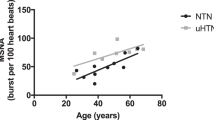Abstract
Introduction
Our study aimed to disclose the relationship of cardiac sympathetic nerve innervation and excitability to myocardial hypertrophy in very old elderly male hypertensive patients with low serum testosterone level.
Methods
A total of 80 elderly male hypertensive patients aged from 80 to 95 years were recruited. Heart rate variability is determined by 24 h dynamic electrocardiogram and heart rate variability analysis system. Cardiac function and left ventricular mass index were determined using color Doppler ultrasound.
Results
Standard deviation of all normal sinus R–R intervals over 24 h (SDNN) significantly decreased in hypertensive cardiac hypertrophy patients as compared with those without cardiac hypertrophy. SDANN and Standard deviation of the average normal sinus R–R intervals for all 5-min segment index, time-domain index reflecting sympathetic nerve tension, obviously decreased and LFnu and LFnu/HFnu, frequency-domain index representing sympathetic nerve excitability, significantly increased in hypertensive cardiac hypertrophy patients as compared with those without cardiac hypertrophy. Myocardial norepinephrine content significantly increased while tyrosine hydroxylase expression significantly lowered in hypertensive cardiac hypertrophy patients, and a negative correlation between myocardial tyrosine hydroxylase expression and myocardial norepinephrine content was present. Serum total testosterone level decreased in hypertensive cardiac hypertrophy patients and was an independent risk factor for the increase in myocardial norepinephrine content and decrease in tyrosine hydroxylase expression.
Conclusions
These data confirm that cardiac sympathetic nerve hypoinnervation and relative increase in cardiac sympathetic nerve excitability are closely related to cardiac hypertrophy in very old hypertensive patients. A lower serum total testosterone level was the independent risk factor of cardiac sympathetic nerve hypoinnervation and relative increase in excitability in very old male hypertensive patients.

Similar content being viewed by others
References
Iso H, Kiyama M, Doi M, Nakanishi N, Kitamura A, Naito Y, Sato S, Iida M, Konishi M, Shimamoto T. Left ventricular mass and subsequent blood pressure changes among middle-age men in rural and urban Japanese populations. Circulation. 1994;89(4):1717–24.
Schlaich MP, Kaye DM, Lambert E, Sommerville M, Socratous F, Esler MD. Relation between cardiac sympathetic activity and hypertensive left ventricular hypertrophy. Circulation. 2003;108:560–5.
Eisenhofer G, Friberg P, Rundqvist B, Quyyumi AA, Lambert G, Kaye DM, Kopin IJ, Goldstein DS, Esler MD. Cardiac sympathetic nerve function in congestive heart failure. Circulation. 1996;93:1667–76.
Dang A, Zheng D, Wang B, Zhang Y, Zhang P, Xu M, Liu G, Liu L. The role of the renin-angiotensin and cardiac sympathetic nervous systems in the development of hypertension and left ventricular hypertrophy in spontaneously hypertensive rats. Hypertens Res. 1999;22(3):217–21.
Guo H, Cheng J, Lee JD, Ueda T, Shan J, Wang J. Relationship between hypertensive left ventricular hypertrophy, neurohormonal factors and ventricular arrhythmias in very old patients. Acta Cardiol. 2004;59(1):47–50.
Chow LT, Chow SS, Anderson RH, Gosling JA. Autonomic innervation of the human cardiac conduction system: changes from infancy to senility—an immunohistochemical and histochemical analysis. Anat Rec. 2001;264(2):169–82.
Nardozza Júnior A, Szelbracikowski Sdos S, Nardi AC, Almeida JC. Age-related testosterone decline in a Brazilian cohort of healthy military men. Int Braz J Urol. 2011;37(5):591–7.
Seidman SN. Androgens and the aging male. Psychopharmacol Bull. 2007;40(4):205–18.
Tsang S, Wu S, Liu J, Wong TM. Testosterone protects rat hearts against ischaemic insults by enhancing the effects of alpha(1)-adrenoceptor stimulation. Br J Pharmacol. 2008;153:693–709.
Han Y, Fu L, Sun W, Cao J, Xie R, Zhou P, Kang N, Sun J. Neuroprotective effects of testosterone upon cardiac sympathetic function in rats with induced heart failure. Eur J Pharmacol. 2009;619(1–3):68–74.
Palatini P, Visentin P, Mormino P, Mos L, Canali C, Dorigatti F, Berton G, Santonastaso M, Dal Follo M, Cozzutti E, Garavelli G, Pegoraro F, D’Este D, Maraglino G, Zanata G, Biasion T, Bortolazzi A, Graniero F, Milani L, Pessina AC. Structural abnormalities and not diastolic dysfunction are the earliest left ventricular changes in hypertension. Am J Hypertens. 1998;11:147–56.
Kimura K, Kanazawa H, Ieda M, Kawaguchi-Manabe H, Miyake Y, Yagi T, Arai T, Sano M, Fukuda K. Norepinephrine-induced nerve growth factor depletion causes cardiac sympathetic denervation in severe heart failure. Auton Neurosci. 2010;156(1–2):27–35.
Fogari R, Preti P, Zoppi A, Fogari E, Rinaldi A, Corradi L, Mugellini A. Serum testosterone levels and arterial blood pressure in the elderly. Hypertens Res. 2005;28:625–30.
Białek M, Zaremba P, Borowicz KK, Czuczwar SJ. Neuroprotective role of testosterone in the nervous system. Pol J Pharmacol. 2004;56(5):509–18.
Tehranipour M, Moghimi A. Neuroprotective effects of testosterone on regenerating spinal cord motoneurons in rats. J Mot Behav. 2010;42(3):151–5.
Meusburger SM, Keast JR. Testosterone and nerve growth factor have distinct but interacting effects on structure and neurotransmitter expression of adult pelvic ganglion cells in vitro. Neuroscience. 2001;108:331–4.
Partanen M, Hervonen A. The effects of long-term castration on the histochemical demonstrable catecholamines in the hypogastric ganglion of the rat. Auton Nerv Syst. 1979;1:139–47.
Acknowledgments
This work was supported by Special Foundation for Atherosclerosis of Chinese Medical Association on Clinical Scientific Research (No. 09010490204).
Conflict of interest
None.
Author information
Authors and Affiliations
Corresponding author
Rights and permissions
About this article
Cite this article
Li, S., Zhang, L., Guo, Y. et al. Relationship of Cardiac Sympathetic Nerve Innervation and Excitability to Cardiac Hypertrophy in Very Elderly Male Hypertensive Patients. High Blood Press Cardiovasc Prev 20, 115–121 (2013). https://doi.org/10.1007/s40292-013-0018-z
Received:
Accepted:
Published:
Issue Date:
DOI: https://doi.org/10.1007/s40292-013-0018-z




